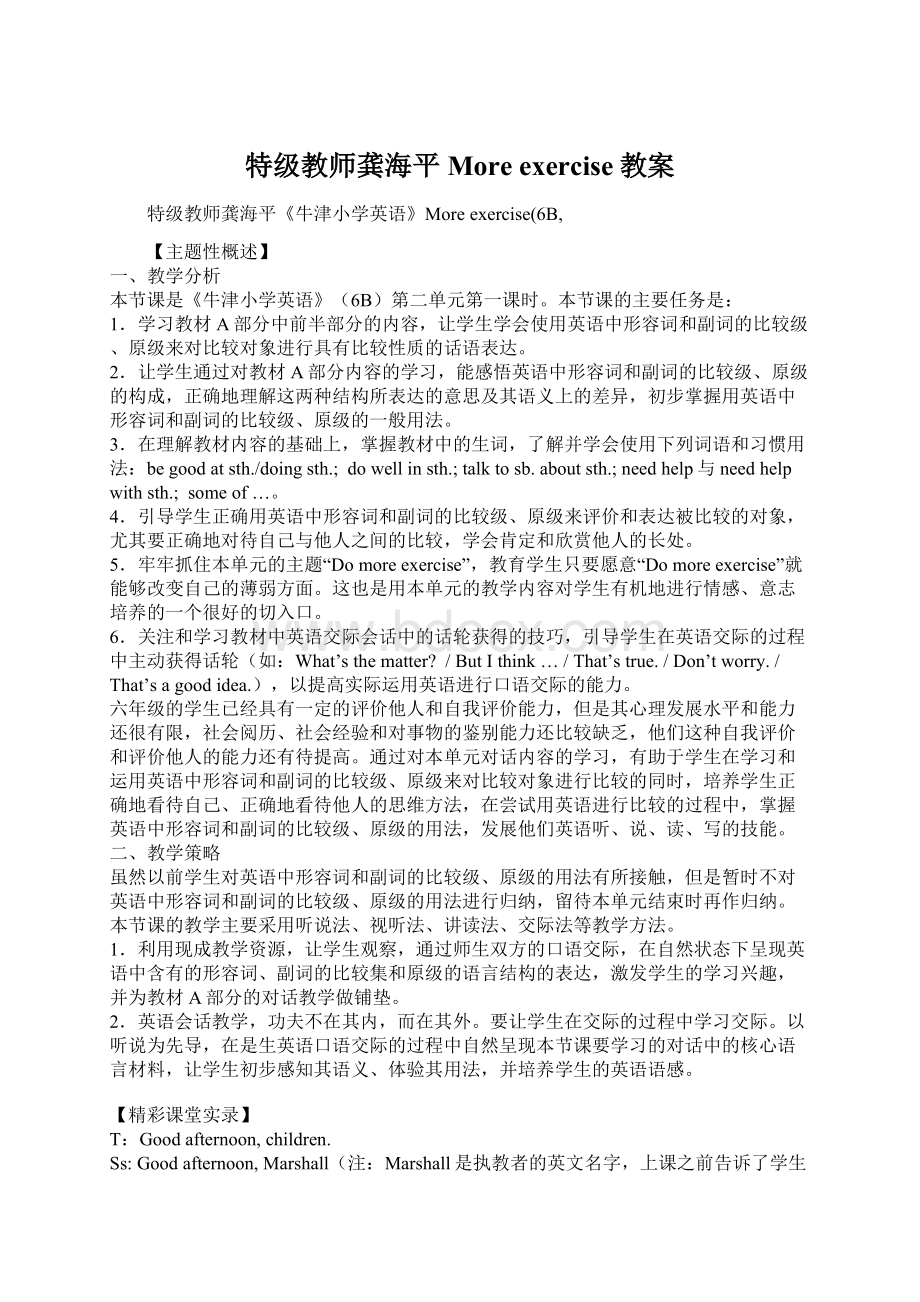特级教师龚海平More exercise教案.docx
《特级教师龚海平More exercise教案.docx》由会员分享,可在线阅读,更多相关《特级教师龚海平More exercise教案.docx(10页珍藏版)》请在冰豆网上搜索。

特级教师龚海平Moreexercise教案
特级教师龚海平《牛津小学英语》More exercise(6B,
【主题性概述】
一、教学分析
本节课是《牛津小学英语》(6B)第二单元第一课时。
本节课的主要任务是:
1.学习教材A部分中前半部分的内容,让学生学会使用英语中形容词和副词的比较级、原级来对比较对象进行具有比较性质的话语表达。
2.让学生通过对教材A部分内容的学习,能感悟英语中形容词和副词的比较级、原级的构成,正确地理解这两种结构所表达的意思及其语义上的差异,初步掌握用英语中形容词和副词的比较级、原级的一般用法。
3.在理解教材内容的基础上,掌握教材中的生词,了解并学会使用下列词语和习惯用法:
begoodatsth./doingsth.; dowellinsth.;talktosb.aboutsth.;needhelp与needhelpwithsth.; someof…。
4.引导学生正确用英语中形容词和副词的比较级、原级来评价和表达被比较的对象,尤其要正确地对待自己与他人之间的比较,学会肯定和欣赏他人的长处。
5.牢牢抓住本单元的主题“Domoreexercise”,教育学生只要愿意“Domoreexercise”就能够改变自己的薄弱方面。
这也是用本单元的教学内容对学生有机地进行情感、意志培养的一个很好的切入口。
6.关注和学习教材中英语交际会话中的话轮获得的技巧,引导学生在英语交际的过程中主动获得话轮(如:
What’sthematter?
/ButIthink…/That’strue./Don’tworry./That’sagoodidea.),以提高实际运用英语进行口语交际的能力。
六年级的学生已经具有一定的评价他人和自我评价能力,但是其心理发展水平和能力还很有限,社会阅历、社会经验和对事物的鉴别能力还比较缺乏,他们这种自我评价和评价他人的能力还有待提高。
通过对本单元对话内容的学习,有助于学生在学习和运用英语中形容词和副词的比较级、原级来对比较对象进行比较的同时,培养学生正确地看待自己、正确地看待他人的思维方法,在尝试用英语进行比较的过程中,掌握英语中形容词和副词的比较级、原级的用法,发展他们英语听、说、读、写的技能。
二、教学策略
虽然以前学生对英语中形容词和副词的比较级、原级的用法有所接触,但是暂时不对英语中形容词和副词的比较级、原级的用法进行归纳,留待本单元结束时再作归纳。
本节课的教学主要采用听说法、视听法、讲读法、交际法等教学方法。
1.利用现成教学资源,让学生观察,通过师生双方的口语交际,在自然状态下呈现英语中含有的形容词、副词的比较集和原级的语言结构的表达,激发学生的学习兴趣,并为教材A部分的对话教学做铺垫。
2.英语会话教学,功夫不在其内,而在其外。
要让学生在交际的过程中学习交际。
以听说为先导,在是生英语口语交际的过程中自然呈现本节课要学习的对话中的核心语言材料,让学生初步感知其语义、体验其用法,并培养学生的英语语感。
【精彩课堂实录】
T:
Goodafternoon,children.
Ss:
Goodafternoon,Marshall(注:
Marshall是执教者的英文名字,上课之前告诉了学生。
).
T:
VerynicetogiveyouanEnglishclasshere.(注:
因为执教者是教研员,这是执教者借班上的一节全区六年级英语研讨课。
)Youknow, myEnglishnameisMarshall.IsMarshalltallorshort?
Pleasetellme.
S1:
Youareshort,Marshall.(学生大笑,因为执教者确实个子不高!
)
T:
Yes,I’mshort.Butwhoisshorter,youorme?
(执教者做出显示“矮”的身势!
)
S1:
I’mshorter.
T:
IsheshorterthanMarshall?
Ss:
Yes.
T:
Oh,itdoesn’tmatter,boy.Youarejustshorterthanme.Actually,youarenotshort.YouareOkay. (执教者巧妙地有引出了教材的对话中将会出现的“Itdoesn’tmatter.”这句话,为学习对话又作了铺垫!
)Youknow, heisaboy.ButIamaman.Heisyoung.Iamold.I’molderthanhim.(又是一个含有形容词比较级的句子出现了!
)
(执教者在黑板上画上简笔画,两个男孩,分别命名Sam和Mike,并注明年龄12岁和13岁。
)
T:
Now,pleaselookattheblackboard.Herearetwoboys.TheyareSamandMike.Samis12yearsold,andMikeis13yearsold.Pleasetellmewhoisolder?
Ss:
Mikeisolder.
T:
Yes.Youareright.Mikeisolder.Mikeisolderthan…(执教者故意不说完整,突然停顿,启发学生接着说。
)
Ss:
Sam!
T:
Yes!
(执教者带着夸张的语调和神情大声肯定!
)MikeisolderthanSam.Well,howmanyyearsisMikeolderthanSam?
Ss:
Oneyear.
T:
That’strue.(执教者作肯定状,在不经意地、恰到好处地引出了对话中即将要教的“That’strue.”,让学生在没有正式学习这一说法之前先根据口语交际的语境和执教者的表情、身势判断出“That’strue.”的大概语义。
)MikeisoneyearolderthanSam.Well,whois11yearsold?
(执教者指着一个男生。
) Pleasestandup.And,whois13yearsold?
Pleasestandup.(执教者指着一个女生。
)Whoisyounger,theboyorthegirl?
(为了激活学生的思维,防止学生的英语思维停留于惯性,这时执教者突然换了一个表语形容词来进行描述。
)
S2:
Thegirlisyounger.
Ss(未等到执教者评判,许多学生大声地笑着说):
No.Theboyisyounger.(实际上,执教者是故意先让学生说的!
)
T(执教者问S2):
Howoldistheboy?
S2:
11.
T:
Correct.Don’tworry.(执教者故意地在学习对话之前先让学生重温以前学过的、对话中将会再次出现的“Don’tworry”这句话!
)Andhowoldisthegirl?
S2:
13.
T:
Yes.Youknow,theboyis11andthegirlis13.Whoisolder?
S2:
Theboyisolder.(学生大笑!
)Sorry,thegirlisolder!
T:
Exactly!
Youaresmart!
Pleasesitdown.(稍停顿。
)Look, herearetwopencils.Oneisgreen,theotherisred.Whichpencilislonger,theredoneorthegreenone?
Ss:
Thegreenone.
T:
Good.Andwhichoneisshorter?
S3:
Theredpencilisshorter.
T:
That’strue.(稍停顿。
)Now,pleaselookatMarshall.Pleasestandup(指着一个男生。
).Look,Marshallisveryfat.Whoisfatter,Marshallortheboy?
Ss:
Marshallisfatter!
(学生大笑!
)
T:
Isthattrue?
S4:
Yes!
T:
Whoisthinner,Marshallortheboy?
S5:
Theboyisthinner.
T:
Ah,yes.Well,(执教者指着窗子外面的天空。
)pleaselook.What’stheweatherliketoday?
S6:
Todayissunny.
T:
Sunny?
Ah,yes.It’ssunnytoday.Wasyesterdaysunnyhere?
(执教者知道这里昨天天下了雨,故意问这样的问题,就是为了下面自然呈现含有形容词、副词比较级和原级的句子!
教学语言生活化、情境化,能够使学生有话可说,顺利达成口语交际目标!
)
S7:
No,itwasrainy.
S8:
Anditwascloudyalso.
T:
Itwasrainyandcloudyyesterday.That’strue.(执教者作肯定状,在不经意地再次引出了对话中即将要教的“That’strue.”,让学生进一步根据口语交际的语境和执教者的表情、身势判断出“That’strue.”的大概语义。
)Thankyou.Yes,todayissunny.And,todayiswarm,isn’tit?
Ss:
Yes.
T:
Whichdayiswarmer,todayoryesterday?
(执教者由形象比较对象之间的比较发展到抽象抽象比较对象之间的比较,符合小学生的认知特点!
)
S9:
Todayiswarmer.
T:
Why?
S9:
Becauseitrainsyesterday.
T:
Becauseitrainsyesterday?
(执教者故意加重“rains”一词的发音,以期引起学生对口语表达中的动词时态用法错误的注意!
)
S9:
Becauseitrainedyesterday.
T:
Weknow,therearefourseasonsintheyear.Whatarethey?
Ss:
Spring,summer,autumnandwinter.
T:
Whichseasonishotter,springorsummer?
S10:
Summerishot.
T:
Summerishot?
Yes.Summerishot.Butmyquestionis“Whichseasonishotter?
”.(执教者故意加重“hotter”一词的发音,以启发学生自主纠正口语表达中的错误!
)
S10:
Summerishotter.
T:
Issummerhotterthanspring?
Ss:
Yes!
T:
Whichseasoniscolderthanspring?
(执教者改变了提问方式,丰富了英语语言信息的输出!
)
S11:
Winteriscolderthanspring.
T:
Youaregreat!
Yes,winteriscolderthanspring.Inwinter,itisusuallyverycold.Sometimesitsnows.Andwecanseesnowinwinter.Canweseesnowinspring?
Ss:
No.
T:
Well,thingsarenotalwaysthesame.InBeijing,peoplesometimesseesnowinspring.
S12:
InHarbin,peoplesometimescanseesnowinspring.
(这时,又有学生举手想说别的北方地区的人们可以在春天看到雪。
执教者意识到,必须马上切换话题,否则就会偏离教学目标。
)
T:
Asweknow,therearetwelvemonthsintheyear.TheyareJanuary,February, March,…(执教者不再继续说下去,而是以自己的手势、表情引导学生接着说下去,以便让学生回忆一下英语中月份的名称。
)
Ss:
April,May,June,July,August,September,October,NovemberandDecember.
T:
Yes.WhichmonthiswarmerinYangzhou,JanuaryorMay?
S13:
Mayiswarmer.
T:
Right.InYangzhou,springusuallycomesinMarch.Treesandgrassturngreen.ButinJanuary, itisstillwinterhere.Itisstillvery(执教者稍停顿,诱发学生说出单词“cold”。
)coldhere.Right?
Ss:
Yes!
T:
Whocanpleasetellmehowmanysubjectyoustudythisterm?
S14:
Six.
T:
Good.Andwhatarethey?
S14:
They’reChinese,Maths,English,PE.,MusicandArt.
T:
Well,whichsubjectdoyoulike?
S14:
IlikeEnglish.
T:
Verygood.IsupposeyouaregoodatEnglish.Right?
(执教者板书“begoodat… 擅长于”。
)
S14:
Yes,Iam.(这一教学环节过渡非常自然!
)
T:
Youknow,I’manEnglishteacher.AmIgoodatEnglish?
(执教者很自然地将对话中将要学习的新的语言表达方式“begoodat”呈现出来了。
)
Ss:
Yes.
T:
Sorry,youarewrong.(执教者微笑!
)I’manEnglishteacher.ButI’mnotgoodatEnglish.WhatsubjectisMarshallgoodat?
Canyouguess?
(执教者引导学生学会使用“begoodat”这一对话中将要学习的新的语言表达方式。
)
S15:
AreyougoodatChinese,Marshall?
T:
Sorry.No.
S16:
AreyougoodatMaths,Mr.Gong?
T:
No,notatall.
S17:
Areyougoodatart?
T:
Art?
Ilikeitverymuch.ButI’mnotgoodatit.(执教者有意识地帮助学生区分了“”和“”的语义,避免了学生理解和使用中可能出现的混淆。
)
S18:
Marshall,areyougoodatmusic?
T:
Yes!
(执教者做出喜悦状。
)I’mgoodatmusic.Icansingmanysongs,Chinesesongsandforeignsongs.
S19:
Marshall,canyousinganEnglishsongforusnow?
T:
Yes,ofcourse.Butpleaseaskmelikethis:
Marshall,couldyoupleasesinganEnglishsongforusnow?
“Couldyou”,not“Canyou”.I’myourteachernow.Pleaseaskmeinapoliteway.Okay?
S19:
Okay.Thankyou.
(执教者唱英语歌曲“Whenwewereyoung”,学生鼓掌!
)
T:
IstheEnglishsongnice?
Doyoulikeit?
Ss:
Yes,verynice.
T:
Thankyou,boysandgirls.I’mgoodatmusicandalsoIdowellinPE. (执教者板书“dowellin…在某方面做得好”)Especially, Idoverywellinswimming.WhenIwasasyoungasyou,Imean,whenIwasasmallboy, Icouldswimintheriverforanhour.Icouldswimmuchbetterthanmyclassmates.(执教者既巧妙地呈现了“dowellin”,又灵活地将“as+adj.+as”这一形容词原级的表达方式和“betterthan…”这一副词的比较级表达方式有机地结合起来呈现出来,大大地丰富了英语语言的信息量。
)
T:
WhodoeswellinMaths?
Pleasehandup.(部分学生举手!
)
T:
WhodoeswellinEnglish?
Pleasehandup.(大部分学生举手!
)
T:
WhodoeswellinChinese?
Pleaseraiseyourlefthand.(少数学生举手!
)
T(执教者指着一个女生):
WhyareyounotgoodatChinese?
S21:
IlikeChinese.ButIdon’tdowellin“xiezuowen”(学生不知道英语中“写作文”怎么表达,只能用汉语拼音代替。
)
T:
Ah,Isee.Youmeanyoudon’tdowellinwriting.Right?
S21:
Yes.
T(执教者指着另一个男生):
Whataboutyou,boy?
S22:
Idon’tdowellinwriting,too.
T:
Isee.Youdon’tdowellinwriting,either.Neversay“Idon’tdowellinwriting,
too.” Pleasesay“Idon’tdowellinwriting,either.”(执教者加重“either”的发音。
) Someofyoudon’tdowellinwriting,notallofyou.(有机呈现对话中将要学习的“someof…”这一说法。
)Butitdoesn’tmatter.Whoisgoodatwriting?
Ss:
Nancy.
T:
WhoisNancy?
Pleasestandup.Youaregoodatwriting,Nancy.Right?
S23(Nancy):
Yes.
T:
What’syoursecret?
S23:
Ilikereading.AndIwritediarieseveryday.
T:
Oh,really?
Great!
NowIsee,ifyouwanttodobetterinwriting,pleaseread
moreandwritemore. (执教者板书“readmoreandwritemore”,并在“more”下面划上一条红线,注上中文“较多;更多”,以帮助学生理解。
)Readmoreandwritemore,youcandobetterinwriting.
(出示对话教学挂图。
)
T:
Ihaveastudent.HisnameisJim.Heisaverysmartboy.Look,thisisJim’sphoto.JimisinGradeSix.HeisgoodatEnglishandMaths.HisMusicandArtarealsoOkay.But, hedoesn’tdowellinPE.HewantstodobetterinPE.Buthedoesn’tknowhow.Andnowheistalkingtothemanaboutit.Themanisn’thisteacher.Themanishisfather.Whataretheytalking?
Nowlet’slistentothetape.(整体呈现对话录音材料。
)
T:
IsJimgoodatEnglish?
S24:
Yes,heis.AndheisalsogoodatMaths.
T:
DoesJimneedhelpwithhishomework?
(执教者板书“needhelpwith…”,并加注中文意思。
)
Ss:
No.
T:
IsJimhappy?
Ss:
No,heisn’t.
T:
Why?
S25:
Becausehedoesn’tdowellinPE.
T:
CanJimrunasfastasBen?
S26:
No,hecan’t.BenrunfasterthanJim.
T:
BenrunfasterthanJim?
(执教者故意加重“run”的发音。
)
S26:
Sorry.BenrunsfasterthanJim.
T:
That’strue.ButcanJimrunasfastasMike?
Ss:
No.
T:
Why?
S27:
BecauseMikerunsasfastasBen,andBenrunsfasterthanJim,soJimcan’trunasfastasMike.
T:
Yes.Perfect.Butlisten.Whenweusetheword“because”,wedon’tusethe“so”.So,wemaysayinthisway:
BecauseMikerunsasfastasBen,andBenrun